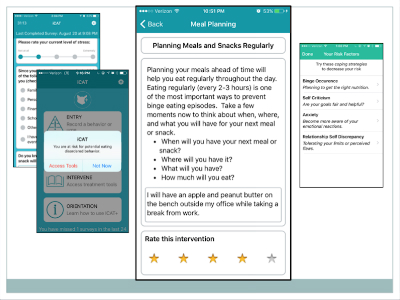An App for Binge Eating Disorder and Bulimia
January 3, 2017
 iCAT+ app
iCAT+ app
For the approximately 8 million Americans who suffer from binge eating disorder, help could be just a download away.
Psychologists in Drexel’s Laboratory for Innovations in Health-Related Behavior Change are developing a new smartphone application that aims to tackle binge eating, and they are seeking study volunteers to test it out.
The app, called iCAT+, is for patients who suffer from binge eating disorder or bulimia nervosa. It uses an approach called Integrative Cognitive-Affective Therapy (ICAT) to identify users’ binge “triggers” and teaches coping skills to change unhealthy eating behaviors. ICAT is a type of individual psychotherapy that focuses on helping people change their behaviors, feelings and thoughts about themselves.
Binge eating disorder — only recently identified as an official diagnosis — is the most common eating disorder in the United States. During a binge episode, a person will eat large amounts of food in a short period of time. A binge is characterized by a sense of loss of control and can be accompanied by feelings of guilt or self-loathing.
In 2013, Shire Pharmaceuticals sponsored an initiative that engaged Drexel psychology researchers to develop a self-guided mobile app for binge eating disorder, based on a psychotherapy known as Cognitive behavioral therapy (CBT). Since then, the CBT content was licensed by Daylan Digital, LLC, and incorporated into their mobile health platform. The app, called iTakeControl Binge, is now available for download.
Based on the development of that app, the Drexel researchers are now finding out how technology and in-person treatment can be used together. iCAT+ may be useful, for instance, for tech-savvy patients who like the idea of treatment that travels with them, but also don’t want to give up face-to-face time with a therapist.
"When a person is experiencing an urge to binge or other distressing emotional experience, it’s often difficult to remember and utilize the skills they’ve learned in therapy," said Adrienne Juarascio, PhD, an assistant research professor in the College of Arts and Sciences, who is leading the study. "We wanted to find out how we can help patients, in the moment, know when and how to use those skills."
Read more at the Drexel News Blog